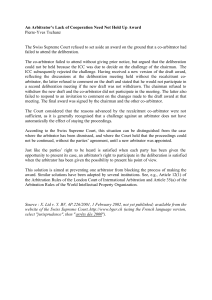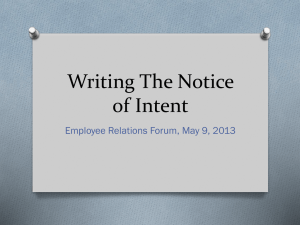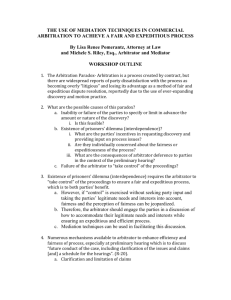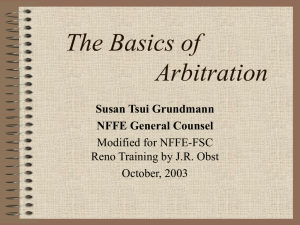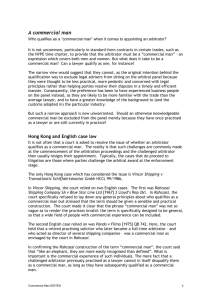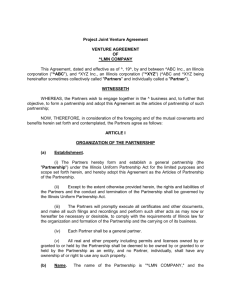Summary of Presentation: The Arbitrator as Leader and Facilitator
advertisement
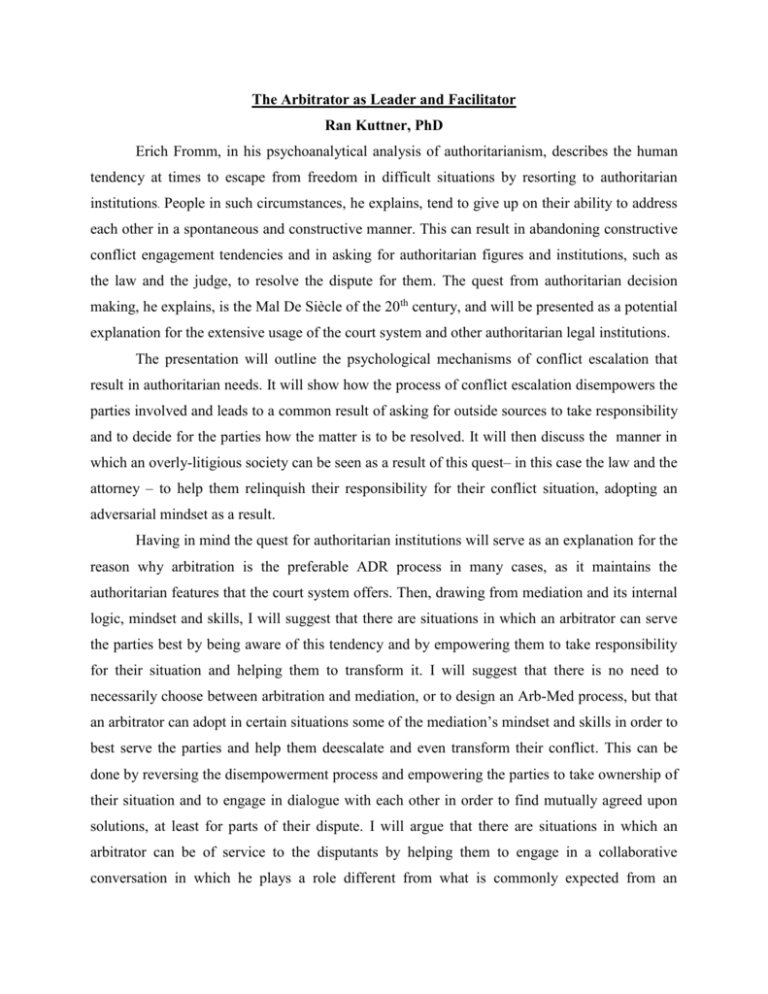
The Arbitrator as Leader and Facilitator Ran Kuttner, PhD Erich Fromm, in his psychoanalytical analysis of authoritarianism, describes the human tendency at times to escape from freedom in difficult situations by resorting to authoritarian institutions. People in such circumstances, he explains, tend to give up on their ability to address each other in a spontaneous and constructive manner. This can result in abandoning constructive conflict engagement tendencies and in asking for authoritarian figures and institutions, such as the law and the judge, to resolve the dispute for them. The quest from authoritarian decision making, he explains, is the Mal De Siècle of the 20th century, and will be presented as a potential explanation for the extensive usage of the court system and other authoritarian legal institutions. The presentation will outline the psychological mechanisms of conflict escalation that result in authoritarian needs. It will show how the process of conflict escalation disempowers the parties involved and leads to a common result of asking for outside sources to take responsibility and to decide for the parties how the matter is to be resolved. It will then discuss the manner in which an overly-litigious society can be seen as a result of this quest– in this case the law and the attorney – to help them relinquish their responsibility for their conflict situation, adopting an adversarial mindset as a result. Having in mind the quest for authoritarian institutions will serve as an explanation for the reason why arbitration is the preferable ADR process in many cases, as it maintains the authoritarian features that the court system offers. Then, drawing from mediation and its internal logic, mindset and skills, I will suggest that there are situations in which an arbitrator can serve the parties best by being aware of this tendency and by empowering them to take responsibility for their situation and helping them to transform it. I will suggest that there is no need to necessarily choose between arbitration and mediation, or to design an Arb-Med process, but that an arbitrator can adopt in certain situations some of the mediation’s mindset and skills in order to best serve the parties and help them deescalate and even transform their conflict. This can be done by reversing the disempowerment process and empowering the parties to take ownership of their situation and to engage in dialogue with each other in order to find mutually agreed upon solutions, at least for parts of their dispute. I will argue that there are situations in which an arbitrator can be of service to the disputants by helping them to engage in a collaborative conversation in which he plays a role different from what is commonly expected from an arbitrator; moreover, such collaborative conversations can be of service to the arbitrator himself when approaching the decision-making process and the need to come up with a resolution that would be most appropriate and beneficial for the parties. In arbitration the parties quite probably have already gone through some attempts at reaching settlement prior to the arbitration process and they may not see the arbitrator’s job to seek for collaborative engagement between them. However, even in this setting, the parties are still looking for leadership from the arbitrators: they are not just employing an underling to make a decision. Even if the parties themselves are looking to the arbitrator for a particular type of leadership that provides them with the answer to the problem, this does not preclude that the arbitrator actually provides something slightly different. The presentation will also draw from current leadership scholarship, in which the leader is perceived differently from the more traditional images of a charismatic, authoritarian ruler. It will show how the Zeitgeist calls for a new understanding of leadership, having characteristics of a facilitator, servant and supporter, seeing his role more in terms of setting the ground for people to perform at their best, empowered to engage with each other in creative ways and seeking for resolutions of their situations through joint decision making rather then by resorting to power. With that understanding, an arbitrator can perceive his leadership role in different terms: if at certain points during the arbitration process he is perceived as a leader that provides support and guidance for parties’ decision-making and collaborative engagement, the arbitrator provides a different perspective of his leadership role. As mentioned, in times of conflict a common tendency is to seek for an “old type” of leadership and expectations that the arbitrator would meet these expectations. However, that does not necessarily serve best the parties needs and plays into an underlying assumption that they gave up on their strengths, their ability to take control over their life situation. With the understanding of leadership as stewardship as a facilitative role gaining popularity in recent decades, and by performing as a leader that empowers the disputants to find their strengths to see the complex situation they are in not in either/or, black-or-white terms in which one is right or just while the other party is wrong or unjust, that may open up new possibilities for the arbitrator and the parties to explore resolutions that would take into account the complexity of the situation and would serve best all of them, without necessarily resorting to mediation and to a more radical setting in which the third-party neutral has no decision power at all.

